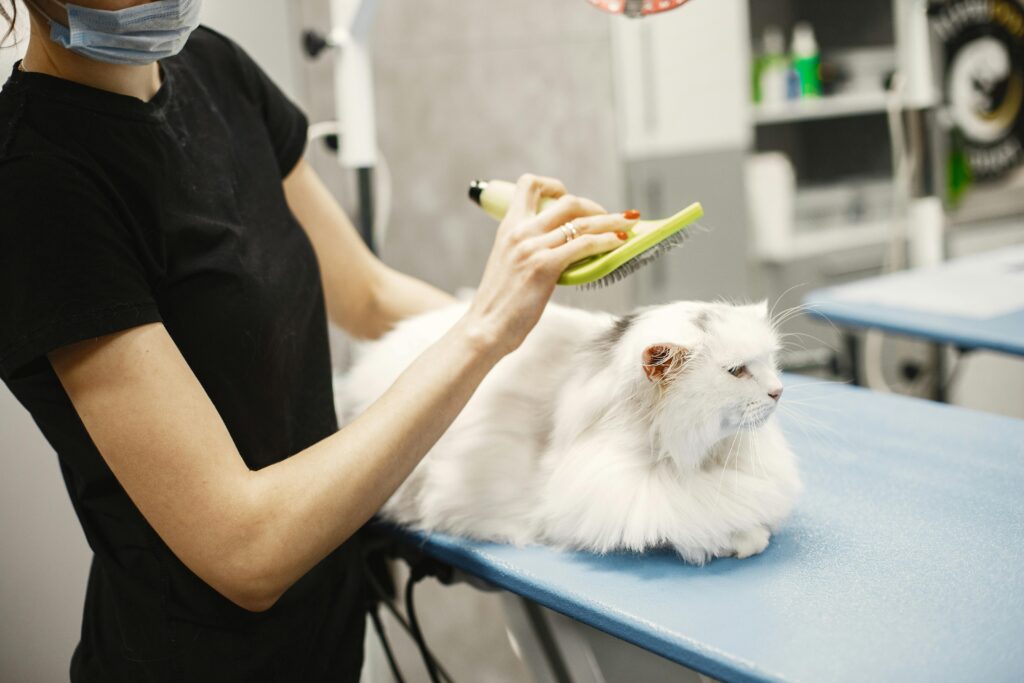Feline Urinary Tract Infection (UTI)
As a responsible and caring cat owner, it is essential to be vigilant about your feline companion’s health and well-being. One common ailment that cats can face is a Urinary Tract Infection, commonly known as a UTI. While it may seem like a minor concern, untreated UTIs can lead to severe complications and discomfort for your beloved pet.
What is a Cat UTI?
A Urinary Tract Infection occurs when bacteria, typically from the cat’s own environment, find their way into the urinary tract system. This can encompass the bladder, urethra, ureters, and even the kidneys. If left untreated, a UTI can progress and lead to more serious conditions, potentially affecting the overall health of your cat.
Early Detection Saves Lives
Detecting a UTI in its early stages is crucial for your cat’s well-being. Cats are known for their stoic nature, often masking discomfort or pain, which makes it imperative for owners to be vigilant and observant. Understanding the signs and symptoms of a UTI is the first step in providing timely care.
Trusting a Veterinarian’s Expertise
While home remedies can offer some relief, it is essential to consult a veterinarian for a thorough diagnosis and treatment plan. A veterinarian is equipped with the knowledge and tools necessary to accurately identify and address the specific needs of your cat. Together, we can work towards restoring your feline companion’s urinary health and overall quality of life.
Causes and Risk Factors
Understanding the underlying causes and risk factors of feline Urinary Tract Infections is essential for effective management and prevention.
1. Bacterial Invasion: UTIs often occur when bacteria from the environment enter the urinary tract system. This can happen due to improper hygiene or other underlying health conditions.
2. Anatomy and Gender: Female cats are generally more prone to UTIs due to their shorter urethra, which allows bacteria easier access to the urinary tract. Male cats, however, may be at a higher risk for urinary blockages.
3. Age and Health Status: Older cats and those with weakened immune systems or pre-existing health issues are more susceptible to UTIs.
4. Diet and Hydration: Inadequate water intake or an improper diet can contribute to urinary tract issues, making it important to provide balanced nutrition and ensure your cat stays well-hydrated.
Signs and Symptoms
Recognizing the signs of a UTI in your cat is vital for timely intervention. Cats may not always display overt symptoms, so careful observation is key.
1. Increased Frequency of Urination: If you notice your cat making more trips to the litter box than usual, it could be an indication of a UTI.
2. Straining or Difficulty Urinating: A cat with a UTI may appear to be in discomfort while urinating, possibly vocalizing or spending an extended period in the litter box.
3. Blood in Urine: Hematuria, or blood in the urine, is a significant red flag and warrants immediate attention from a veterinarian.
4. Changes in Behavior: Cats with UTIs may become unusually irritable, lethargic, or display signs of distress.
5. Strong Odor or Cloudy Urine: Foul-smelling or cloudy urine can indicate the presence of infection or inflammation.
Home Remedies for Cat UTI
If you’re thinking how can i treat my cat’s uti at home, you’re at the right place. While consulting a veterinarian is paramount for treating a cat with a UTI, there are several home remedies for cat UTI that can complement professional care. These remedies aim to promote urinary tract health and alleviate discomfort. It is crucial to remember that any home remedy should be discussed with and approved by your veterinarian before implementation. So, how to treat UTI in cats? Here are some useful tips:
-
Increase the water intake of your feline.
-
Give your cat Cranberry supplements.
-
Mix Apple Cider Vinegar in your cat’s water or wet food.
-
Choose a high-quality, cat-specific probiotic.
-
Use Corn Silk as a natural diuretic.
Let us discuss in detail, each one of these tips now.
A. Increased Water Intake
Encouraging your cat to drink more water is a fundamental step in managing and preventing UTIs. Adequate hydration helps dilute the urine and flush out bacteria from the urinary tract.
Tips for increasing water intake:
-
Provide fresh, clean water in a clean bowl daily.
-
Consider a cat water fountain to entice your cat to drink more.
-
Offer wet cat food in addition to dry kibble, as it contains higher moisture content.
B. Cranberry Supplements
Cranberry supplements have been suggested as a natural remedy for UTIs in both humans and cats. They contain compounds that may help prevent bacteria from adhering to the walls of the urinary tract.
Important considerations:
-
Use cranberry supplements specifically formulated for cats, as human supplements may contain ingredients harmful to them.
-
Always consult your veterinarian before introducing any supplements into your cat’s diet.
C. Apple Cider Vinegar
Apple cider vinegar is known for its potential antibacterial properties. When used in moderation and under veterinary guidance, it may help create an environment less conducive to bacterial growth in the urinary tract.
Proper usage of apple cider vinegar:
-
Dilute a small amount of apple cider vinegar in your cat’s water or wet food, following your veterinarian’s recommended dosage.
D. Probiotics
Probiotics are beneficial bacteria that support a healthy gut flora. They may also play a role in maintaining a balanced urinary tract environment.
Selecting and administering probiotics:
-
Choose a high-quality, cat-specific probiotic recommended by your veterinarian.
-
Follow the recommended dosage for your cat’s size and weight.
E. Corn Silk
Corn silk, the fine threads found inside corn husks, is considered a natural diuretic. It may help increase urine production and promote a healthy urinary tract.
Using corn silk for urinary health:
-
Consult your veterinarian for appropriate dosage and administration.
Remember, these home remedies are intended to complement professional veterinary care, not replace it. Your veterinarian’s expertise is invaluable in creating a comprehensive treatment plan for your cat’s UTI.
Diet and Cat UTI
A well-balanced diet plays a crucial role in maintaining urinary tract health in cats. By providing the right nutrients, you can help prevent the recurrence of UTIs and support your cat’s overall well-being.
A. The Role of Diet in Preventing UTIs
-
Balanced pH Levels: A diet that maintains a slightly acidic pH level in the urine can help create an environment less conducive to bacterial growth in the urinary tract.
-
Optimal Moisture Content: Wet cat food contains higher moisture content, aiding in keeping the urinary tract flushed and preventing the concentration of minerals that can lead to crystal formation.
-
Protein Moderation: While protein is essential, excessive amounts can lead to an excess of certain compounds in the urine that may contribute to urinary tract issues.
B. Specialized Urinary Tract Health Cat Food
Specialized cat food designed to promote urinary tract health is available and can be a valuable addition to your cat’s diet, especially if they are prone to UTIs.
-
Prescription Diets: These are formulated under the guidance of veterinarians and are specifically designed to address urinary tract issues.
-
Quality Commercial Options: Some reputable commercial cat food brands offer lines dedicated to urinary health. Look for options with balanced pH levels and appropriate moisture content.
C. Dietary Tips for Cats Prone to UTIs
Consult with Your Veterinarian: Discuss your cat’s specific needs and any dietary restrictions or recommendations with your veterinarian.
-
Monitor Protein Intake: Ensure that your cat’s diet contains an appropriate amount of high-quality protein without excess.
-
Offer a Variety of High-Quality Foods: Providing a mix of wet and dry food options can help maintain a balanced diet.
-
Avoid Free-Feeding: Instead, establish regular feeding times to monitor portion sizes and prevent overeating.
-
Limit Treats and Human Food: Some treats and human foods can contribute to urinary tract issues. Always consult your veterinarian before introducing new treats.
By paying careful attention to your cat’s diet and providing appropriate nutrition, you can play a significant role in supporting their urinary tract health. However, it’s crucial to remember that any dietary changes should be discussed with your veterinarian to ensure they are tailored to your cat’s specific needs.
Litter Box Management
A clean and well-maintained litter box is not only essential for your cat’s overall hygiene but also plays a crucial role in preventing urinary tract issues. Proper litter box management can significantly contribute to your cat’s urinary tract health.
A. Significance of a Clean Litter Box
-
Prevents Bacterial Growth: A clean litter box reduces the risk of bacterial contamination, which can exacerbate or contribute to UTIs.
-
Encourages Regular Urination: Cats are more likely to use a clean litter box consistently, ensuring that their bladder is emptied regularly.
-
Reduces Stress: A clean environment helps create a stress-free space for your cat, which is essential for urinary tract health.
B. Tips for Maintaining a Clean Litter Box
-
Frequent Scooping: Scoop waste from the litter box at least once a day to keep it clean and odor-free.
-
Regular Cleaning: Empty the entire litter box, clean it with a mild, unscented detergent, and refill it with fresh litter on a weekly basis.
-
Choose the Right Litter: Opt for a clumping or non-clumping litter that your cat prefers. Avoid strongly scented litters, as they may irritate your cat’s sensitive urinary tract.
-
Provide Multiple Litter Boxes: If you have multiple cats, ensure each cat has their own litter box and consider having an extra one to prevent territorial disputes.
C. Litter Type and Box Placement
-
Litter Type: Some cats have preferences for specific types of litter. Experiment to find the one that your cat is most comfortable with.
-
Box Placement: Place the litter box in a quiet, easily accessible location away from your cat’s food and water bowls. Avoid placing it in high-traffic areas or near noisy appliances.
By implementing proper litter box management, you create a clean and comfortable environment that supports your cat’s urinary tract health. Regular maintenance of the litter box is a simple yet effective way to contribute to your cat’s overall well-being.
Stress Management
Stress can have a significant impact on your cat’s overall health, including their urinary tract. Understanding and addressing potential sources of stress is essential in preventing and managing UTIs.
A. The Link Between Stress and UTIs
Impact on Immune Function: Chronic stress can weaken the immune system, making your cat more susceptible to infections, including UTIs.
Changes in Urinary Behavior: Stress can lead to changes in your cat’s urination habits, potentially increasing the risk of UTIs.
Promotion of Hormonal Changes: Stress can alter hormonal balance, potentially contributing to urinary tract issues.
B. Strategies for Reducing Stress in Cats
Create a Safe and Enriched Environment: Provide hiding spots, climbing structures, and interactive toys to offer mental and physical stimulation.
Maintain Consistent Routines: Cats thrive on predictability. Stick to regular feeding, play, and sleep schedules.
Limit Exposure to Stressors: Identify and minimize sources of stress, such as loud noises, excessive handling, or conflicts with other pets.
Consider Pheromone Diffusers: Feline pheromone diffusers can create a calming atmosphere and help reduce stress levels.
Consult with a Veterinarian or Behaviorist: If your cat experiences chronic stress, seeking professional advice from a veterinarian or certified animal behaviorist can be invaluable.
C. Environmental Enrichment for a Happy Cat
Interactive Playtime: Engage your cat with interactive toys to provide mental and physical stimulation.
Provide Vertical Spaces: Vertical spaces, such as cat trees or shelves, offer opportunities for exploration and a sense of security.
Offer Secure Hiding Spots: Provide cozy hiding places where your cat can retreat when feeling overwhelmed.
Routine Grooming and Affection: Regular grooming sessions and affectionate interactions can strengthen the bond between you and your cat, providing comfort and reassurance.
By actively managing stressors and creating a nurturing environment, you can significantly contribute to your cat’s overall well-being and urinary tract health. Remember, a stress-free cat is more likely to maintain optimal urinary health. In the next section, we will discuss the importance of timely veterinary care in managing UTIs.
Frequently Asked Questions (FAQs) About Cat UTIs
1. Can I use over-the-counter antibiotics to treat my cat’s UTI?
It is crucial to consult a veterinarian before administering any medication to your cat. Over-the-counter antibiotics may not be suitable for treating a UTI, as the specific type of bacteria and appropriate dosage need to be determined by a professional.
2. How can I tell if my cat has a UTI?
Look for signs such as increased frequency of urination, straining to urinate, blood in the urine, and changes in behavior. If you notice any of these symptoms, seek veterinary care promptly.
3. Are male cats more prone to UTIs than females?
While female cats have a higher incidence of UTIs due to their anatomy, male cats can develop urinary blockages, which can be life-threatening. Both genders should receive prompt veterinary attention for suspected UTIs.
4. Can stress be a primary cause of UTIs in cats?
Yes, stress can contribute to UTIs in cats. It can weaken their immune system and lead to changes in urinary behavior. Implementing stress-reduction techniques and maintaining a calm environment can help prevent UTIs.
5. How can I prevent urinary crystals in my cat?
Feeding a balanced diet, providing ample hydration, and ensuring a clean litter box are essential in preventing the formation of urinary crystals. Consulting your veterinarian for specific dietary recommendations is also crucial.
6. Are there breeds more prone to UTIs?
Certain breeds, such as Siamese and Burmese cats, may be predisposed to urinary tract issues. However, UTIs can occur in any breed, so vigilant care and regular veterinary check-ups are important for all cats.
7. Can UTIs be contagious between cats?
UTIs are typically caused by bacteria from the cat’s own environment, and they are not considered contagious between cats. However, if one cat in a multi-cat household has a UTI, it’s important to monitor the others for any signs of similar symptoms.
8. Can UTIs lead to kidney problems in cats?
Untreated or recurrent UTIs can potentially lead to kidney damage over time. This underscores the importance of early detection and prompt veterinary care for suspected UTIs in cats.
Key Takeaways
We now know how to treat cat UTI at home. Although, these tips should only be followed after due consultation with your vet.
Early Detection is Critical: Recognizing the signs of a UTI and seeking veterinary care promptly is essential for your cat’s well-being.
Home Remedies Can Be Supportive: While consulting a veterinarian is paramount, certain home remedies, when used under professional guidance, can aid in managing and preventing UTIs.
Diet and Environment Matter: Providing a balanced diet, maintaining a clean litter box, and minimizing stressors are integral in supporting urinary tract health.
Regular Veterinary Check-ups are Vital: Routine check-ups allow for early detection of potential issues and provide an opportunity for tailored preventive care.
By combining your love, dedication, and home remedy for cat UTI with the expertise of a veterinarian, you can help ensure that your cat enjoys optimal urinary tract health and overall well-being. Your commitment to their health is a testament to the strong bond you share. If you follow the tips we’ve outlined in this post, cat UTI treatment at home is certainly possible.
Thank you for being a vigilant and caring cat owner. Together, we can provide the best possible care for our feline companions.






